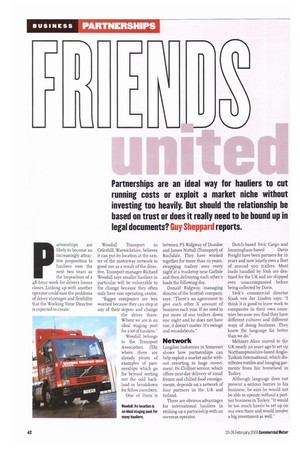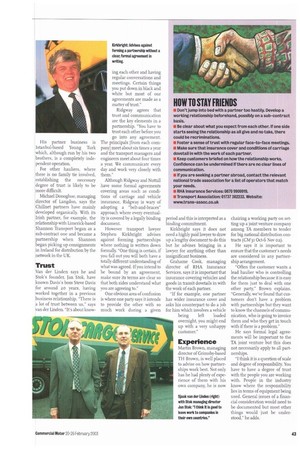Partnerships are an ideal way for hauliers to cut running
Page 42

Page 43

If you've noticed an error in this article please click here to report it so we can fix it.
costs or exploit a market niche without investing too heavily. But should the relationship be based on trust or does it really need to be bound up in legal documents? Guy Sheppard reports.
Partnerships are likely to become an increasingly attractive proposition to hauliers over the next two years as the imposition of a 48-hour week for drivers looms closer. Linking up with another operator could ease the problems of driver shortages and flexibility that the Working Time Directive is expected to create.
Woodall Transport in Coleshill, Warwickshire, believes it can put its location at the centre of the motorway network to good use as a result of the directive. Transport manager Richard Woodall says smaller hauliers in particular will be vulnerable to the change because they often only have one operating centre.
"Bigger companies are less worried because they can stop at any of their depots and change the driver there. Where we are is an ideal staging post for a lot of hauliers."
Woodall belongs to the Transport Association (TA) where there are already plenty of examples of partnerships which go far beyond sorting out the odd backload or breakdown for fellow members.
One of them is between PS Ridgway of Dundee and James Nuttall (Transport) of Rochdale. They have worked together for more than so years, swapping trailers over every night at a trucicstop near Carlisle and then delivering each other's loads the following day.
Donald Ridgway, managing director of the Scottish company, says: "There's no agreement to give each other X amount of business each year. If we need to put more of our trailers down one night and he does not have one, it doesn't matter. It's swings and roundabouts."
Network
Langdon Industries in Somerset shows how partnerships can help exploit a market niche without resorting to huge investment. Its Chillnet service, which offers next-day delivery of small frozen and chilled food consignments, depends on a network of four partners in the UK and Ireland.
There are obvious advantages for international hauliers in striking up a partnership with an overseas operator. Dutch-based Stok Cargo and Immingham-based Davis Freight have been partners for so years and now jointly own a fleet of around 300 trailers. Most loads handled by Stok are destined for the UK and are shipped over unaccompanied before being collected by Davis.
Stok's commercial director Sjaak van der Linden says: "I think it is good to leave work to companies in their own countries because you find they have different cultures and different ways of doing business. They know the language far better than we do."
Mehmet Aksu moved to the UK nearly zo years ago to set up Northamptonshire-based AngloTurkish International, which distributes textiles and hanging garments from his homeland in Turkey.
Although language does not present a serious barrier to his business, he says he would not be able to operate without a partner business in Turkey. "It would be too much hassle to set up on our own there and would involve a big investment as well."
His partner business is Istanbul-based Young Turk which, although run by his two brothers, is a completely independent operation.
For other hauliers, where there is no family tie involved, establishing the necessary degree of trust is likely to be more difficult.
Michael Donoghue, managing director of Langdon, says the Chillnet partners have mainly developed organically. With its Irish partner, for example, the relationship with Limerick-based Shannon Transport began as a sub-contract one and became a partnership when Shannon began picking up consignments in Ireland for distribution by the network in the UK.
Trust
Van der Linden says he and Stok's founder, Jan Stok, have known Davis's boss Steve Davis for around 20 years, having worked together in a previous business relationship. "There is a lot of trust between us," says van der Linden. "It's about know
ing each other and having regular conversations and meetings. Certain things you put down in black and white but most of our agreements are made as a matter of trust."
Ridgway agrees that trust and communication are the key elements in a partnership. "You have to trust each other before you go into any agreement. The principals [from each company] meet about six times a year and the transport managers and engineers meet about four times a year. We communicate every day and work very closely with them.'
Although Ridgway and Nuttall have some formal agreements covering areas such as conditions of carriage and vehicle insurance, Ridgway is wary of adopting a "belt-and-braces" approach where every eventuality is covered by a legally binding document.
However transport lawyer Stephen Kirkbright advises against forming partnerships where nothing is written down formally. "One thing is certain, if you fall out you will both have a totally different understanding of what was agreed. If you intend to be bound by an agreement, make sure its terms are clear so that both sides understand what you are agreeing to."
One obvious area of confusion is where one party says it intends to provide the other with so much work during a given
period and this is interpreted as a binding commitment.
Kirkbright says it does not need a highly paid lawyer to draw up a lengthy document to do this but he advises bringing in a lawyer for anything other than insignificant business.
Grahame Cook, managing director of RHA Insurance Services, says it is important that insurance covering vehicles and goods in transit dovetails in with the work of each partner.
"If for example, one partner has wider insurance cover and asks his counterpart to do a job for him which involves a vehicle
being left loaded overnight, you might end up with a very unhappy customer."
Experience
Martin Brown, managing director of Grimsby-based TH Brown, is well placed to advise on how partnerships work best. Not only has he had plenty of experience of them with his own company, he is now
chairing a working party on setting up a joint venture company among TA members to tender for big national distribution contracts (CM 31 Oct-6 Nov 02).
He says it is important to ensure that the customer's needs are considered in any partnership arrangement.
"Often the customer wants a lead haulier who is controlling the relationship because it is easy for them just to deal with one other party," Brown explains. "Generally, we've found that customers don't have a problem with partnerships but they want to know the channels of communication, who is going to invoice them and who they get in touch with if there is a problem."
He says formal legal agreements will be important to the TA joint venture but this does not necessarily apply to all partnerships.
"I think it is a question of scale and degree of responsibility. You have to have a degree of trust with the people you are working with. People in the industry know where the responsibility lies in terms of equipment being used. General issues of a financial consideration would need to be documented but most other things would just be understood," he adds.




























































































































































